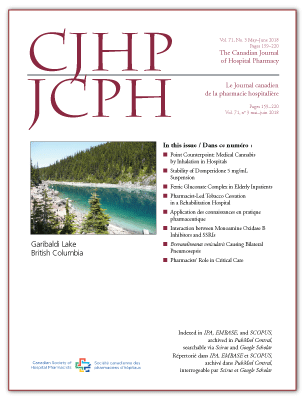Interventions visant l’application des connaissances en pratique pharmaceutique
DOI:
https://doi.org/10.4212/cjhp.v71i3.2585Keywords:
intervention, pharmacien, pharmacie, application des connaissances, transfert des connaissances, pharmacist, pharmacy, knowledge translation, knowledge transferAbstract
RÉSUMÉ
Contexte : La littérature scientifique portant sur l’application des connaissances (AC) est vaste et complexe et les publications sur les interventions dans le domaine de la santé concernent surtout les médecins et les infirmières. Pour autant que les auteurs sachent, il n’existe pas de revue documentaire s’intéressant à l’AC et à ses retombées en pharmacie.
Objectif : Décrire le profil des interventions visant l’AC en pratique pharmaceutique.
Source des données : La plateforme Knowledge Translation+ (KT+) a été utilisée pour en extraire des articles publiés entre janvier 2010 et décembre 2016 à l’aide du terme « pharmacist ».
Sélection des études et extraction des données : Les principales variables retenues pour établir le profil des interventions visant l’AC en pratique pharmaceutique étaient le protocole de recherche de l’étude, le lieu de l’intervention, les rôles du pharmacien, les types de connaissances transférées et les retombées. Le codage de la nature des interventions pharmaceutiques reposait sur la classification du site Impact Pharmacie.
Synthèse des données : Au total, 114 articles ont été sélectionnés : revues systématiques (n = 25, 22 %), études contrôlées à répartition aléatoire (n = 45, 40 %) études rétrospectives (n = 21, 18 %), études prospectives (n = 13, 11 %), études pré-post intervention (n = 10, 9 %). Les études se déroulaient surtout en établissement de santé (74 %). La majorité des interventions ciblaient des étapes de soins pharmaceutiques et la realization de séances d’éducation thérapeutique et de conseils prodigués aux patients. Il existait un manque de rigueur méthodologique lors de la conception des interventions et quant à leur description.
Conclusion : Le pharmacien est le principal producteur de connaissances et oriente les interventions visant leur application vers les patients ou les professionnels de santé. Celles-ci concernaient principalement la démarche de soins pharmaceutiques et le travail en interdisciplinarité. La mise en place d’une formation initiale et continue, la gestion de l’information et la désignation d’un pharmacien responsable de l’AC au sein de chaque département de pharmacie pourraient encourager le développement de cette mise en application des connaissances. Ce concept peut être utile pour soutenir la création d’un modèle de pratique pharmaceutique cohérent.
ABSTRACT
Background: The scientific literature on knowledge translation (KT) is vast and complex, and most publications concerning health care interventions involve physicians and nurses. To the authors’ knowledge, there have been no literature reviews on KT and its impact on pharmacy practice.
Objective: To determine the profile of interventions relating to KT in pharmacy practice.
Data Sources: The term “pharmacist” was used to search the web platform Knowledge Translation+ (KT+) to identify pertinent articles published between January 2010 and December 2016.
Study Selection and Data Extraction: The main variables analyzed to determine the profile of KT interventions in pharmacy practice were the study’s research protocol, the geographic location of the intervention, pharmacist roles, the types of knowledge transferred, and impacts of the interventions. The nature of pharmacy interventions was coded according to the classification on the Impact Pharmacie website.
Data Synthesis: A total of 114 articles were selected: systematic reviews (n = 25, 22%), randomized controlled trials (n = 45, 40%), retrospective studies (n = 21, 18%), prospective studies (n = 13, 11%), and pre-post intervention studies (n = 10, 9%). Most of the studies (74%) were conducted in a health care institution. The majority of interventions targeted pharmaceutical care steps, therapeutic educational sessions, and patient education. There was a lack of methodological rigour during the development of interventions and in their description.
Conclusion: Pharmacists are key generators of knowledge, and their interventions related to KT are directed toward patients or other health care professionals. These interventions have mainly addressed the pharmaceutical care process and interdisciplinary work. The implementation of initial and continuing education, the management of information, and the designation of a pharmacist responsible for KT in each pharmacy department might promote the development of such KT. This concept might in turn support the design of a coherent pharmacy practice model.
Downloads
Published
Issue
Section
License
Copyright © Canadian Society of Healthcare-Systems Pharmacy.
After publication of a manuscript in the CJHP, the authors of the manuscript must obtain written permission from the CSHP (publications@cshp.ca) before reproducing any text, figures, tables, or illustrations from the work in future works of their own. If a submitted manuscript is declined for publication in the CJHP, all said rights shall revert to the authors. Please note that any forms (e.g., preprinted orders and patient intake forms) used by a specific hospital or other health care facility and included as illustrative material with a manuscript are exempt from this copyright transfer. The CJHP will require a letter from the hospital or health care facility granting permission to publish the document(s).










